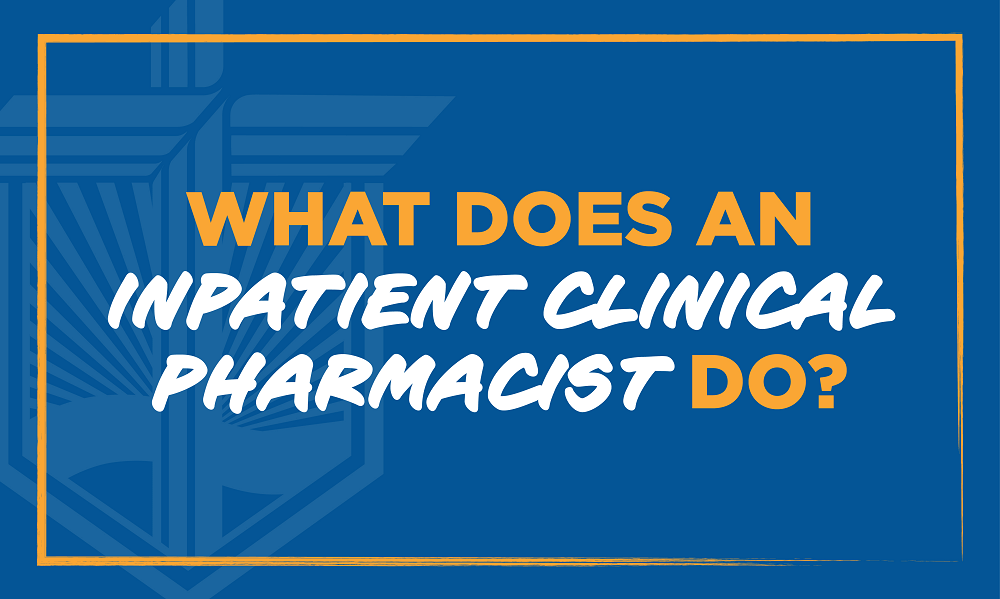
There is a misconception that Pharmacists only work in retail store pharmacies. And while that is one setting they operate in, there are so many other settings in which they are active. We want to start this year by highlighting these numerous settings with an interview with our faculty about their area of expertise. Let’s kick things off with Inpatient Clinical Pharmacists.
Concordia Pharmacy Faculty
Dr. Anne Graff LaDisa, PharmD., BCPS, received her Pharm.D. (2001) from Drake University in Des Moines, IA. In 2012, she joined the faculty at CUWSOP in the Department of Pharmacy Practice. Dr. LaDisa practices as an inpatient clinical pharmacist in an acute care GI/GU surgical unit at Aurora St. Luke’s Medical Center in Milwaukee, WI. She also serves as a preceptor for pharmacy IPPE and APPE students, as well as PGY-1 residents. Check out her insight into being an inpatient clinical pharmacist.
What is an Inpatient Clinical Pharmacist?
A clinical pharmacist is responsible for ensuring the medications prescribed for a patient contribute to the best possible health outcomes. Clinical pharmacists work in various settings, but I work in the inpatient setting, which means I work in a hospital and my patients are hospitalized with acute health issues. Inpatient clinical pharmacists can work in critical care settings, like an ICU (intensive care unit) or an acute care floor (non-intensive care). In larger hospitals, these ICUs or acute care floors can be designated for specific types of patients, like patients with cardiac, neurologic, oncologic, surgical, or internal medicine issues.
What does an Inpatient Clinical Pharmacist do?
I work in a large hospital in Milwaukee on an acute care surgical floor, so my patients are primarily those awaiting or recovering from surgery.
Identifying drug issues
During my shift, I review patients’ new medication orders and monitor their current medication therapy. Additionally, I help to identify drug therapy problems for the patients. These problems can include:
- A patient may need a different antibiotic based on microbiology and culture results.
- Perhaps there is a new medication prescribed for a patient that will interact with a medication they are currently taking and we need to stop or modify one of the two drugs for safety.
- A patient could be taking a medication that could potentially be causing a side effect and I’ll recommend we draw a blood sample to assess the level of medication in their blood.
- Perhaps a patient’s kidneys aren’t functioning properly and the dose of their medication needs to be reduced. Kidneys are one of the ways we clear medications from our bodies.
Working hand in hand with others
Simultaneously we work closely with physicians, nurses, and other health professionals almost daily. We answer any questions they may have about medications and make recommendations on any drug therapy problems. Generally, we will attend patient care rounds with everyone to identify barriers to discharging the patient efficiently and safely.
Transitions in care
In the hospital, we first review the medications a patient was taking prior to admission. This is necessary to evaluate what is appropriate for them to continue taking while they are in the hospital. Next, we identify any problems with the medications that may have led to their acute issue.
Then we may decide to put patients on a new medication, change their dosing, or fully stop taking a medication previously used. Finally, we educate patients on any new medications that they will take after discharge.
Educating residents
Another task I have as a clinical pharmacist is working with graduate students and residents. I regularly work with P4 CUW students who are on their Acute Care clinical rotation. In addition, I work with pharmacy residents who are in their first year of residency training after graduation. Together we take care of our patients while they learn with hands-on experience.
How do I become an Inpatient Clinical Pharmacist?
First, you must receive a Doctor of Pharmacy (PharmD) degree. Pharmacy residencies aren’t required to be inpatient clinical pharmacists, but many working in this area have residency training. Following graduation, I completed a 1-year pharmacy practice residency. Now I’ve been working as an inpatient clinical pharmacist for 20 years.
Additional certifications are also not required, but many clinical pharmacists have advanced certifications. Inpatient clinical pharmacists can specialize in Internal Medicine, Cardiology, Critical Care, Infectious Diseases, Oncology, or Transplant to name a few. After completing my residency I took an exam in addition to my licensing exams and I’m now a Board Certified Pharmacotherapy Specialist (BCPS).
Interested in this specialization?
If the area of Inpatient Clinical Pharmacy peaks your interest, feel free to learn more about our School of Pharmacy and apply for more information.